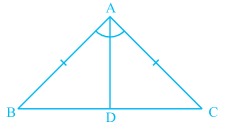त्रिभुज के गुण: Difference between revisions
No edit summary |
(added content) |
||
| (2 intermediate revisions by the same user not shown) | |||
| Line 1: | Line 1: | ||
प्रमेय 1: समद्विबाहु त्रिभुज की समान भुजाओं के सम्मुख कोण समान होते हैं | |||
[[File:Isosceles Triangle -1.jpg|alt=Fig 1 - Isosceles triangle|none|thumb| | [[File:Isosceles Triangle -1.jpg|alt=Fig 1 - Isosceles triangle|none|thumb|चित्र 1- समद्विबाहु त्रिभुज]] | ||
प्रमाण: चित्र 1 में दिखाए गए समद्विबाहु त्रिभुज <math>BCA</math> पर विचार करें, जहाँ <math>AB=AC</math> है। | |||
हमें यह सिद्ध करना होगा कि भुजाओं <math>AB</math>और <math>AC</math> के सम्मुख कोण समान अर्थात् <math>\angle ABC = \angle ACB</math> हैं। | |||
हम पहले <math>\angle BAC</math>का एक समद्विभाजक बनाते हैं और इसे <math>AD</math> नाम देते हैं। | |||
अब <math>\triangle BAD</math> और <math>\triangle CAD</math> में हमारे पास है, | |||
<math>AB=AC</math> ( | <math>AB=AC</math> (दिया हुआ) | ||
<math>\angle BAD =\angle CAD </math> ( | <math>\angle BAD =\angle CAD </math> (संरचना से) | ||
<math>AD=AD</math> ( | <math>AD=AD</math> (दोनों में समान) | ||
अत:, <math>\triangle BAD \cong \triangle CAD</math> (SAS सर्वांगसमता मानदंड द्वारा) | |||
इसलिए, <math>\angle ABC =\angle ACB </math> (CPCT द्वारा) | |||
अतः सिद्ध हुआ। | |||
प्रमेय 2: किसी त्रिभुज के समान कोणों की सम्मुख भुजाएँ समान होती हैं। | |||
प्रमाण: चित्र-1 में दिखाए गए त्रिभुज <math>BCA</math> में, आधार कोण समान हैं और हमें यह प्रमाणित करने की आवश्यकता है कि <math>AB=AC</math> या | |||
<math>BCA</math> एक समद्विबाहु त्रिभुज है। | |||
एक समद्विभाजक <math>AD</math> की रचना कीजिए जो भुजा <math>BC</math> से समकोण पर मिलता है। | |||
<math>\ | अब <math>\triangle BAD</math> और <math>\triangle CAD</math> में हमारे पास है, | ||
<math> | <math>\angle BAD =\angle CAD </math> (संरचना से) | ||
<math> | <math>AD=AD</math> (समान भुजाएँ) | ||
<math>\angle BDA =\angle CDA = 90^\circ </math> (संरचना से) | |||
अत:, <math>\triangle BAD \cong \triangle CAD</math> (ASA सर्वांगसमता मानदंड द्वारा) | |||
इसलिए, <math>AB=AC</math> (CPCT द्वारा) | |||
अथवा <math>\triangle BCA</math> समद्विबाहु है। | |||
[[Category:त्रिभुज]][[Category:कक्षा-9]][[Category:गणित]] | [[Category:त्रिभुज]][[Category:कक्षा-9]][[Category:गणित]] | ||
Latest revision as of 10:55, 18 September 2024
प्रमेय 1: समद्विबाहु त्रिभुज की समान भुजाओं के सम्मुख कोण समान होते हैं
प्रमाण: चित्र 1 में दिखाए गए समद्विबाहु त्रिभुज पर विचार करें, जहाँ है।
हमें यह सिद्ध करना होगा कि भुजाओं और के सम्मुख कोण समान अर्थात् हैं।
हम पहले का एक समद्विभाजक बनाते हैं और इसे नाम देते हैं।
अब और में हमारे पास है,
(दिया हुआ)
(संरचना से)
(दोनों में समान)
अत:, (SAS सर्वांगसमता मानदंड द्वारा)
इसलिए, (CPCT द्वारा)
अतः सिद्ध हुआ।
प्रमेय 2: किसी त्रिभुज के समान कोणों की सम्मुख भुजाएँ समान होती हैं।
प्रमाण: चित्र-1 में दिखाए गए त्रिभुज में, आधार कोण समान हैं और हमें यह प्रमाणित करने की आवश्यकता है कि या
एक समद्विबाहु त्रिभुज है।
एक समद्विभाजक की रचना कीजिए जो भुजा से समकोण पर मिलता है।
अब और में हमारे पास है,
(संरचना से)
(समान भुजाएँ)
(संरचना से)
अत:, (ASA सर्वांगसमता मानदंड द्वारा)
इसलिए, (CPCT द्वारा)
अथवा समद्विबाहु है।
